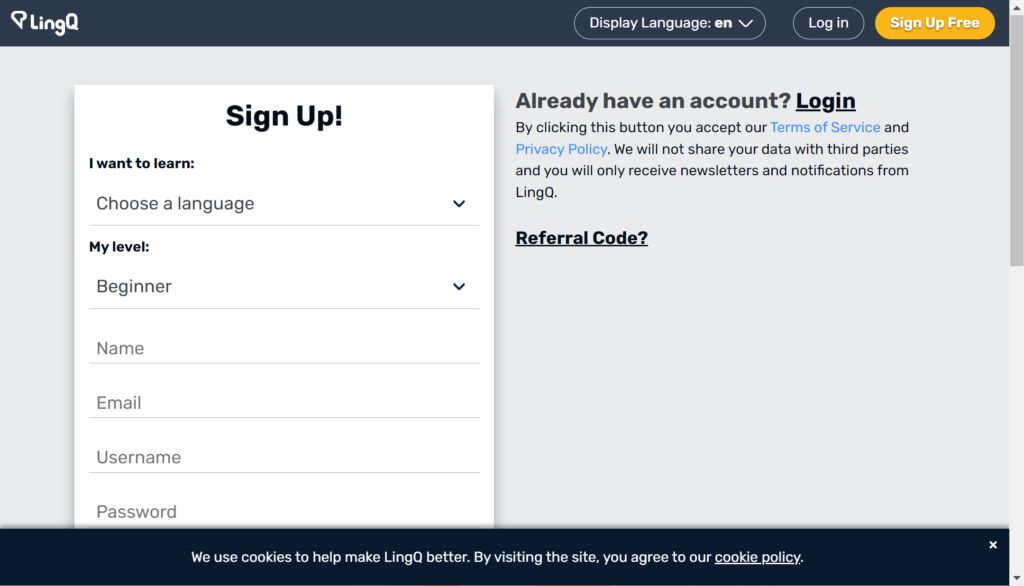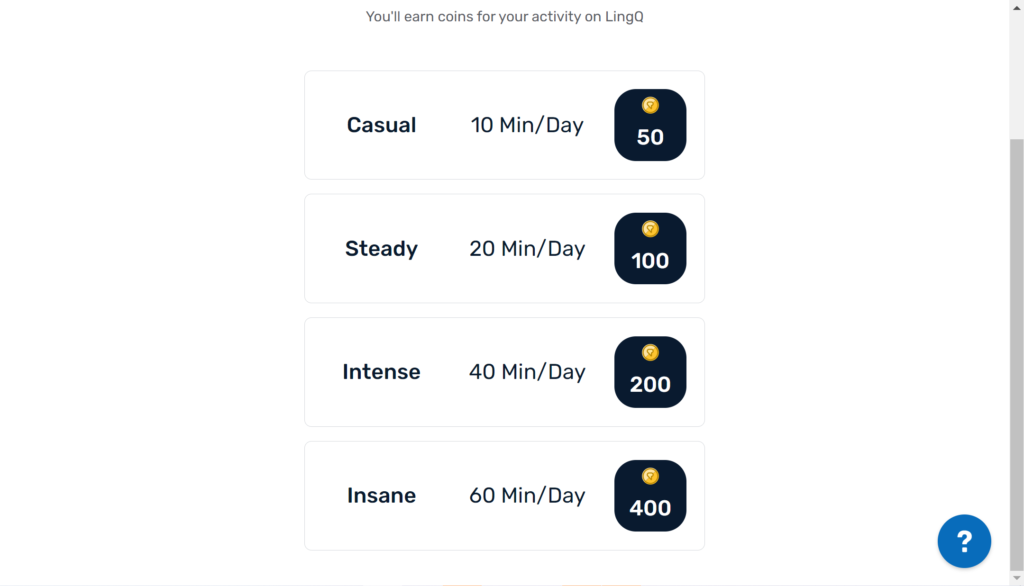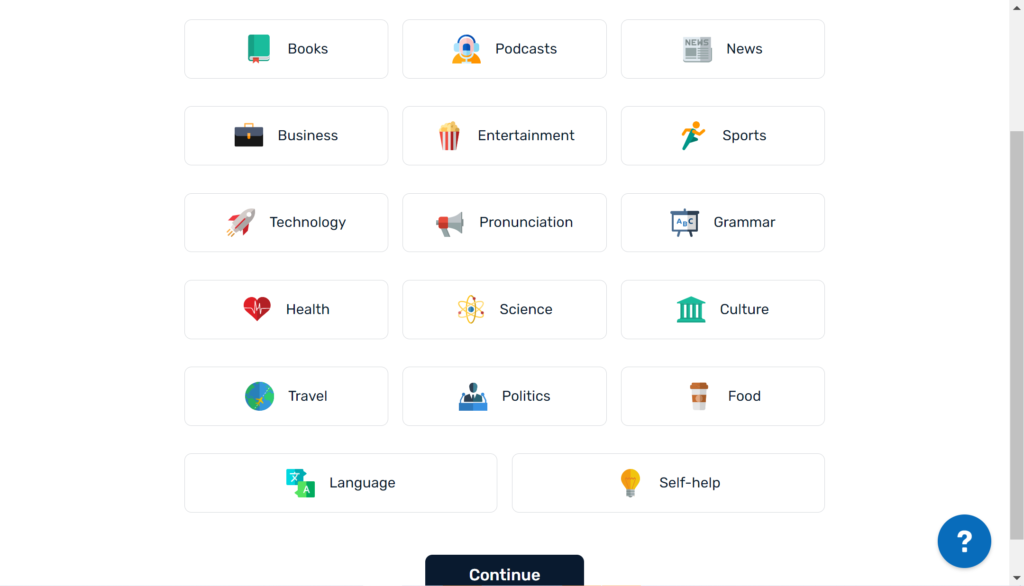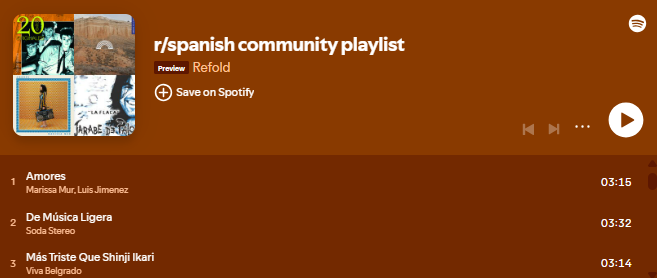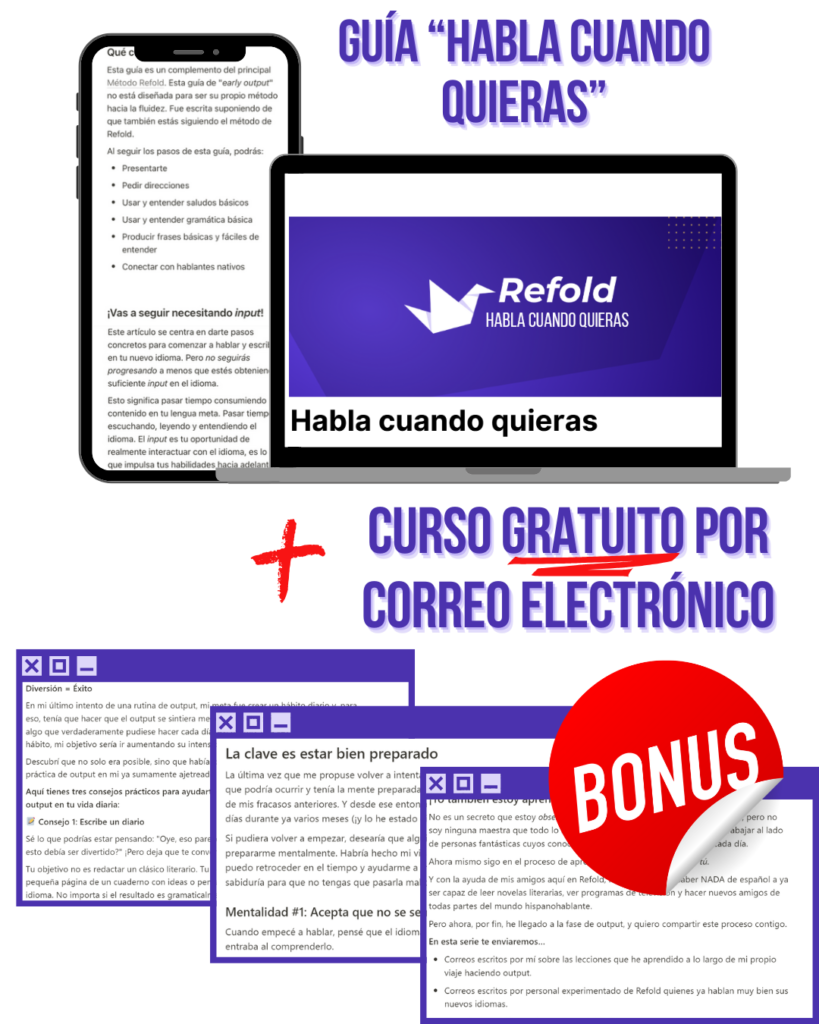LingQ is a great, assisted reading app. It is gamified well, it recently got an update has given it a super sleek look, and it has one of the few immersion learning communities outside of Refold. The content libraries have community volunteers called librarians, and the forums are surprisingly active for our little immersion learning niche. The service can be difficult to use, and this guide aims to remedy that.
Making an Account
When you make an account, it will ask some basic information from you such as what language you’re learning, your name, etcetera. Upon selecting the appropriate language and filling out the fields, you will be greeted with a page asking you what intensity level you want to study at. I’ve been an avid user of LingQ for several years and never really paid any attention to this.
After selecting your intensity level, you will be asked about your interests. In theory this is to populate your recommendations/feed with community managed bookshelves, but in practice I’ve never noticed any difference.
Navigation

After signing in, you’ll be greeted with the main library. Just scrolling will take you through the pre-populated categories done by LingQ and LingQ librarians (volunteers). You can also click the big import button at the top right to add your own content. If you don’t like the premade content, be sure to adjust the slider to the appropriate difficulty. Personally, this is where LingQ shines.
How to Use
LingQ has a built-in tutorial on the mobile app, however if you’ve signed in for the very first time on desktop this won’t be available to you. They do have a small “8 lesson” tutorial in your target language (for most well studied languages), however it really acts as more of an “8 lesson” infomercial than a tutorial.
Choosing a lesson. LingQ has a standard 60 lesson mini-story course for every. single. language. it offers. The mini-stories are designed to teach you the most frequent 1000 lemmas (true words) over the entire course. They’re a bit boring, but they’re a good start to LingQing if you don’t yet have your own graded material (or even native material)! Depending on the language you’re learning, the library may come prepacked with material.

Once you’ve clicked into the lesson, you’ll be greeted with a page of text, all highlighted in blue. At the bottom left, you will see a ▶️ button that will start the audio. Pressing the play button is optional, and I personally don’t enjoy reading and listening at the same time.
Clicking on a blue word will turn it gold. LingQ calls these “LingQs”. You can select from a list of premade definitions for the word. For more widely studied languages, the top-voted definition is usually pretty solid. For less studied languages, the top voted definition may be in a foreign language, or may be totally wrong. If you want to add a custom definition, LingQ provides a list of recommended dictionaries. Select the dictionaries and languages you want (TL-TL) (TL-NL), then copy and paste your definition into a field. Read (and listen if you want) the chosen material, do look-ups when you feel like it, choose the best definitions, and page over to the next page once you’re done. This is the core of LingQ.
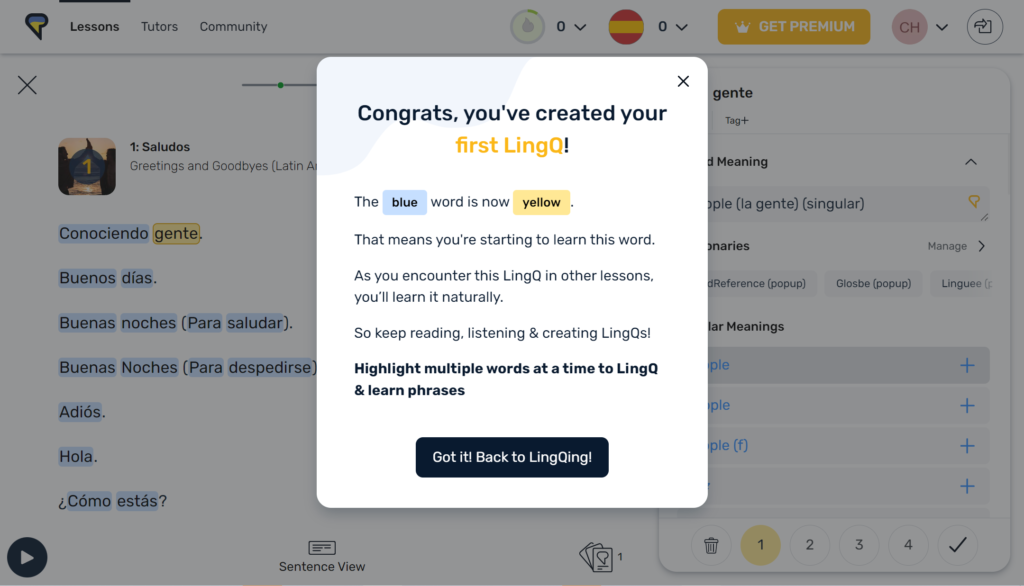
Saving definitions to words (aka making LingQs) saves them to a word list. This word list can be viewed by navigating back to the main page, and clicking on vocabulary. With the vocabulary list we can choose to review them in LingQ, with LingQ’s native flashcard system, or we can export them to a great free and open source software called “Anki” and review them there. We can even ignore them and just keep on reading. I know I do!

I really like that with LingQ you can mark a level as various levels of known. There is a 0-5 system with 0 being never seen, 1 being seen, 2 being recognized, so on and so forth with 5 being known. I personally like to mark words that I am familiar with but not comfortable with as 2-4, before finally marking it as known. A big huge debate in SLA or Second Language Acquisition is “what counts as knowing a word”, I’d argue that it isn’t a binary thing, and you can know a word to varying degrees. Marking a word can also just help remind you how many times you’ve seen it!
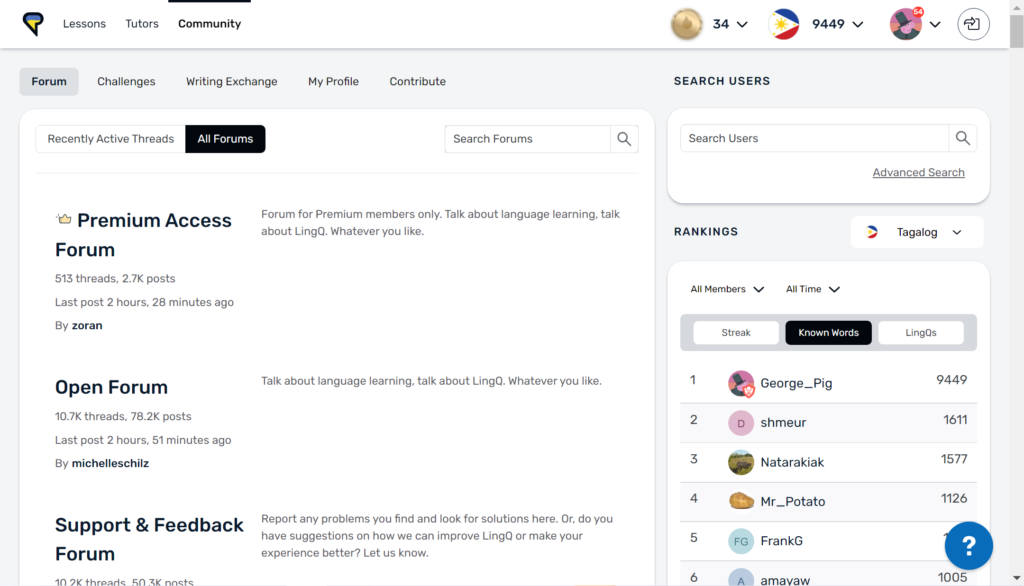
LingQ also provides a sense of a community. On the main library page, you can access the forums by clicking the ‘community’ button. The forums can be searched and function as a great archive of information, the LingQ library can be hard to navigate, so searching for content related to your language here can help you find great courses or media uploaded for your target language. The forums tend to run older than Discord or Reddit communities, so be sure to understand that you’ll be interacting with an older demographic than most of Refold.

Customer service! Surprisingly, LingQ has great customer service and support. If you ever have an issue their Service Level Agreement is 4-5 hours during business hours (something like 8-5 UTC-7 time). They also have a support forum you can post to if you don’t like e-mail.
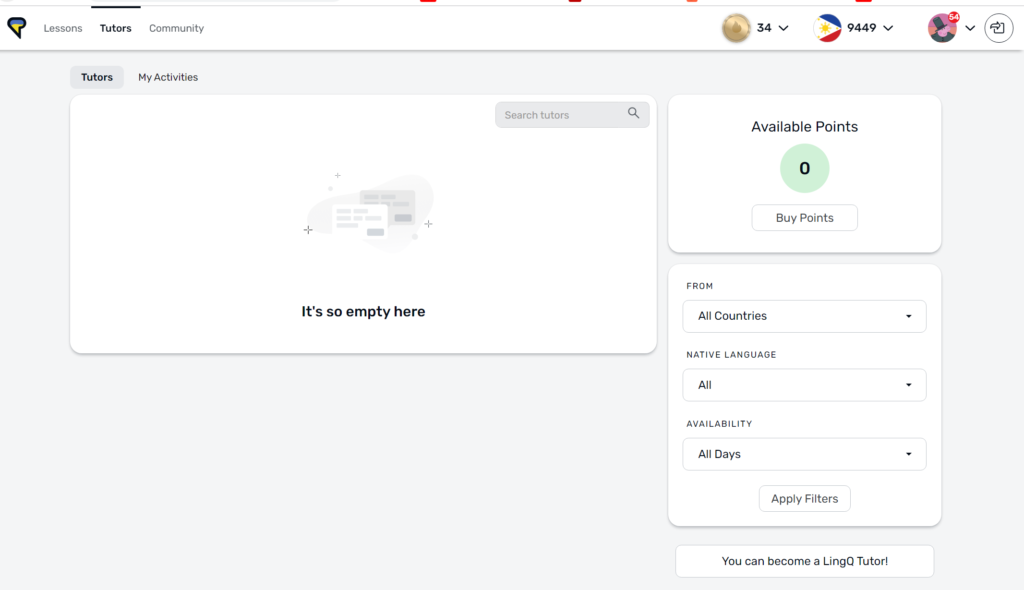
The final service offered by LingQ is tutoring. I’ve not personally used their tutoring service, so I can’t speak to how good it is. It does exist though. In general I would recommend Refolders follow the official advice on how to use tutors, and just replace “italki” with “LingQ”
In Conclusion

I like LingQ a lot. The ideology behind LingQ is very similar to Refold. The service itself works really well for languages written in the Cyrillic or Latin script. It seems to have a harder time with languages written in some other scripts, notably Chinese, Japanese, and Korean, but possibly the Brahmic scripts in South and South East Asia as well. The way it counts words isn’t perfect, and can inflate or deflate your true known word count depending on the language, but despite that it is a great metric to have and one I enjoy very much. I personally find leaderboards, loads of metrics, and a neat community to be very inspiring. Just be sure to import your own content, and to work with LingQs limitations.
All said and done, I believe LingQ is worth giving a shot. It provides a lot of meat and potatoes in a single package, especially for Refolders who don’t want to use 10 different clunky free tools. Using LingQ should be an easy addition to any Refolder’s immersion regiment, once you get past the quirky UX. It isn’t the smoothest to use, and some competitors out compete it in some, but not all (or most) of the features it offers. At the time of writing this article, LingQ is the only fully cross-platform service with native iOS and android applications to offer a complete immersion suite.
Like what you see?
Sign up now and we'll deliver even MORE amazing content like this right to your inbox!
- Receive our exclusive 6 SECRETS to language learning success email course.
- Stay motivated with weekly emails overflowing with helpful language-learning tips, tutorials, and more!
- Get behind the scenes access into the inner workings of Refold!


